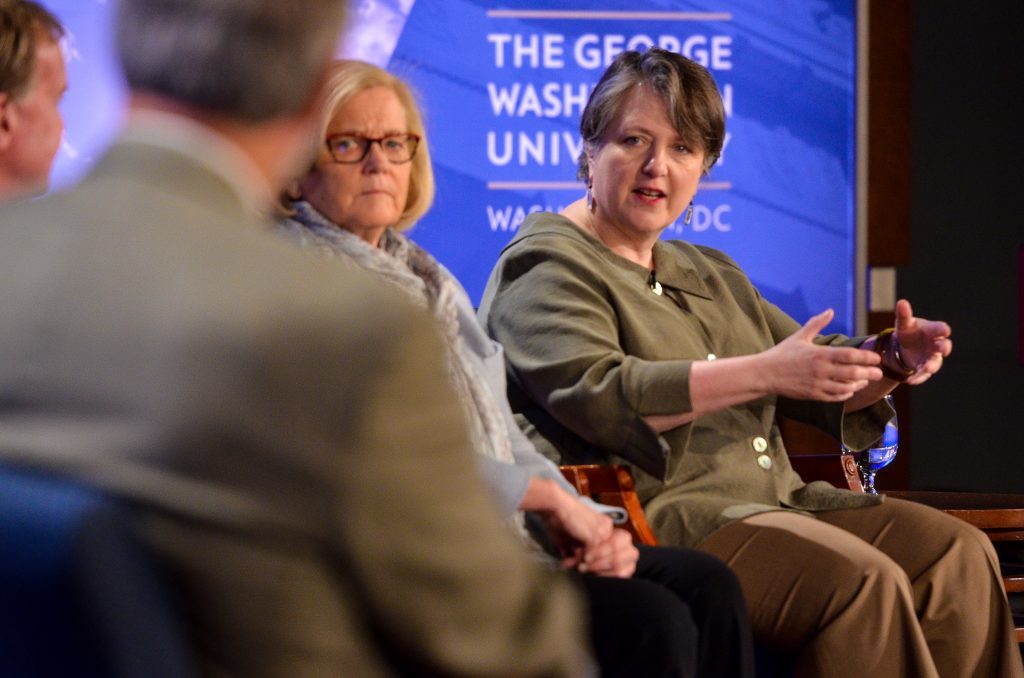Experts gathered at the Jack Morton Auditorium Thursday to talk about the impact the new presidential administration could have on farming legislation.
An Indiana farmer, a congresswoman and a GW sustainability official all spoke to more than 200 people at the Food Tank Summit, a food policy event hosted by GW. Contributing Editor at Food and Environmental Reporting Network Chuck Abbott moderated the panel about the future of food policy called “The Next Bill.”
A multi-year farm bill encompasses food and agricultural programs, according to the Congressional Research Service, and Politico reported that there is the possibility for a new farm bill in 2017, replacing the 2014 version.
Here are some highlights from the panel discussion:
1. The future of the Farm Bill
Matthew Herrick, senior vice president of the public relations firm Story Partners, noted that a majority of corn-producing counties voted for President Donald Trump this past November, but now White House leaders are sending mixed signals and have held “every position possible” on support renewable energy.
The future of a new farm bill remains uncertain in the eyes of many, including Rep. Chellie Pingree, D–Maine, who said this is the “the foggiest crystal ball” she’s ever looked into.
“It might not surprise you that this is an unusual and chaotic time in Washington,” she said. “There is no Secretary of Agriculture and no budget from the executive branch.”
While Pingree and the Executive Director of Sustainability at GW Kathleen Merrigan used terms like “chaos” and “darkness” to describe the scenario, Kip Tom, chairman of Tom Farms, said he is optimistic about the future of farming.
“What I feel as far as the industry goes, we feel we are supported,” he said. “My belief is that the Trump administration will be good on agriculture.”
2. Impact for low-income families
The Farm Bill does more than regulate farmers by providing nationally food and economic security, Herrick said.
“When you go around to the hotspots in the world, you will see that they’re not food secure nations, especially conflict-affected areas in particular,” he said. “We have that benefit here in this country.”
Of the almost $1 trillion dollar budget of the 2014 Farm Bill, roughly 80 percent of the funding went to the Supplemental Nutrition Assistance Program, said Abbott.
Most people that use the SNAP program are working families, children, the elderly, and people who are not able to support themselves, Herrick said. However, the inclusion of SNAP in this year’s bill is uncertain. SNAP funding is already set to be reduced by $100 billion over the next 10 years, he said.
Joe Glauber, a senior research fellow at International Food Policy Research Institute, said the Heritage Foundation, a conservative think tank, wanted to separate food stamps from the rest of the Farm Bill and is pushing for “hacking away at nutrition programs.”
“Most studies conclude that this has been a big help to poor families, and I think that there will be a lot of opposition to cutting that out,” Glauber said.
3. A connection to immigration
A topic of concern throughout the discussion was the promotion of healthy diets and how, or if, it will be included in the Farm Bill. Despite a growing interest in organic food and sustainability in agriculture, there are still threats from Congress to exclude these components, Merrigan said.
“Forces of darkness are coming together thinking, ‘Let’s sharpen the knives on organic,’” Merrigan said. “Research is an important part, but when we look at how much money goes into research around organic food, it’s only 1 percent.”
Merrigan said healthy eating is linked to more complex issues like immigration policy because more and more fruits and vegetables are being imported, she said.
Merrigan said the heads of several companies approached her eight years ago about their inability to maintain a legal workforce and that they were considering moving outside the U.S.
“Without immigration reform, we are at serious risk,” Merrigan said.





